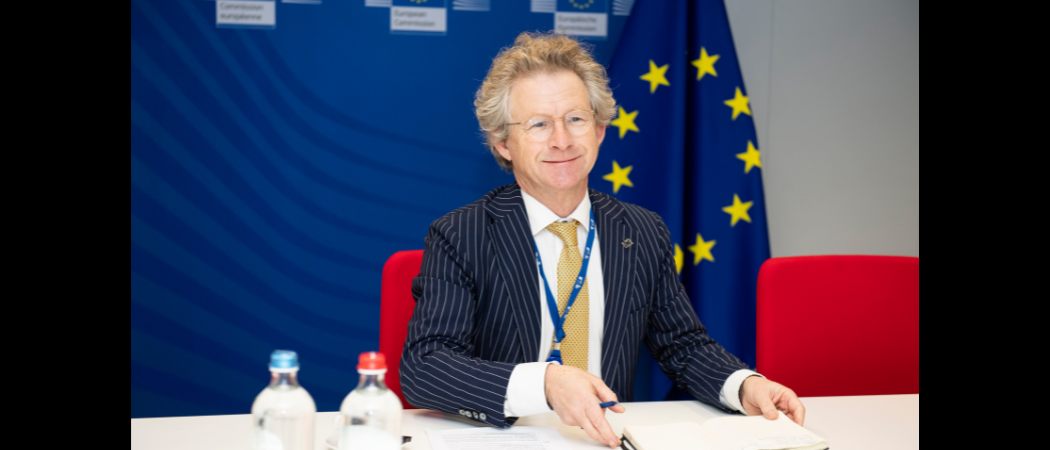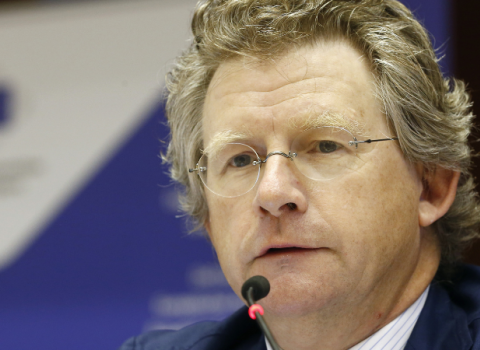The newly released 2024 work programme will introduce lump sum funding and revised intellectual property rules, while the budget is going down from €1.6B to €1.2B

Michiel Scheffer, president of the board of the European Innovation Council. Photo: Lukasz Kobus / European Union
The European Innovation Council work programme for 2024 will see changes to the EU’s start-up fund, as its budget shrinks from €1.6 billion to €1.2 billion.
Changes include a wide-scale introduction of lump sum funding, a much-demanded revision of intellectual property rules, and a stricter selection process.
For 2024, EIC will have a budget of €1.2 billion to be spent through its three schemes: Accelerator, Pathfinder and Transition.
Those involved with the programme are happy with the new rules. “Overall, it goes in the right direction. There are a lot of things that make sense and that should improve the quality of the overall process,” says Xavier Aubry, vice president of the European Association of Innovation Consultants (EAIC).
Aubry, who specialises in helping start-ups secure the in-demand Accelerator grant and equity funding, singles out the more robust selection criteria as a welcome move that he expects will weed out ineligible applications earlier.
Emmanuele Angione, managing partner at Lira venture funding advisory, says the work programme builds on previous improvements, such as the decision to discontinue the EIC AI platform earlier this year. “What you can see is that every year there are certain improvements that are going to the right direction,” he told Science|Business.
Universities, which mostly apply for funding from the EIC’s Pathfinder and Transition schemes, welcomed new intellectual property rules that no longer grant full rights solely to the so-called EIC inventor.
Universities say the new provision recognises the importance of technology transfer offices that help researchers take their innovations to the market – and enable them to do their job.
“The previous rules pitted the inventor against the university,” says Julien Chicot, policy adviser at the Guild of European Research-Intensive Universities. “What we also recognise is that these rules give more responsibility to technology transfer offices and how they support the researchers.”
Management issue
The EIC is the Horizon Europe programme aimed at helping high-risk deep tech start-ups to scale-up and commercialise. It had a rocky start when it launched in 2021 following a three-year pilot phase. The Accelerator equity fund, the first of its kind, ran into management issues as the European Commission struggled to carry out due diligence on companies applying to the scheme.
While its Pathfinder and Transition programmes have been a success, it took a while for Accelerator to get on track and start handing out funding to European start-ups. Now it is up and running, with an independent management firm responsible for due diligence, the EIC is introducing the following changes to improve the programme:
Lump sum funding. Perhaps the biggest change is the introduction of lump sum funding to most parts of the programme. This follows the European Commission’s big push for the new type of less bureaucratic form of handing out research funding.
But here, innovators echo the concerns of researchers who have been awarded other types of Horizon grants. Grant holders will no longer have to account for their spending as a project progresses, but instead applicants will have to specify the budget in advance.
“It’s a radical change in a way you report your project,” says Aubry. “By simplifying the project [reporting] you make the application more complex.”
Start-ups may struggle to fix budgets in advance and then meet expectations. At this stage, it’s unclear how flexible the Commission will be and whether evaluators, who will now be responsible for determining if budgets make sense, will have the right training to understand costs.
Angione is less sceptical, noting the new approach aligns better with the way private investors operate. They don’t expect real cost reporting but rather estimates on milestones and how much work packages, staff and other expenses will cost. “They have simplified that mechanism, and the way to present the plans is really investor friendly,” says Angione. This is important as start-ups that get equity funding from the Accelerator will need to attract private investment too.
More robust selection process. To make it past the first stage of the process companies will now need three out of four remote evaluators to give the green light, rather than two.
This will weed out more applications at the early stages, placing less burden on the second stage evaluators. The programme is oversubscribed, with success rates as low as 5%. “A higher bar is a welcome change,” says Angione.
Another new rule will limit companies to three attempts to apply for funding. Before, companies faced a 12-month cooling off period after two failed applications. Now, after three failures at any stage of the application process, the applicant cannot apply to the EIC under Horizon Europe again. It sends a message that the scheme isn’t for everyone, says Angione.
Lower budget. There’s €1.2 billion in the 2024 budget, down from €1.6 billion in 2023. The EIC had more money this year because it had a top-up from the EU’s €750 billion pandemic recovery fund which has now run out. The Commission has put the EIC Accelerator down for another top-up as part of the mid-term EU budget review, but the member states are unlikely to agree, as government wallets tighten across the bloc.
Of the €1.2 billion, €675 million will go to the EIC Accelerator. Of this, €405 million is earmarked for equity investments and €270 million for grant funding. Another €180 million is earmarked for follow on investments in companies from previous rounds.
With each company receiving up to €2.5 million in grants and up to €15 million in equity, Lira estimates 108 start-ups will be funded, down from 223 in 2022.
The EIC’s Pathfinder programme for breakthrough research has a budget of €256 million for next year, to be handed out in grants of up to €4 million.
The Transition programme will have €94 million for follow-up projects on the outputs of other Horizon Europe programmes, with grants of up to €2.5 million.
More eligibility for Transition grants. These grants, allowing researchers move research results towards commercialisation, will now be open to former recipients of Horizon Europe funding for collaborative projects.
Previously, the grants were only open to previous recipients of European Research Council Proof of Concept, EIC Pathfinder and European Defence Fund projects.
Any move that allows researchers better access to proof-of-concept type of funding in Horizon Europe is good news, says Chicot.
EIB takes the reins. After months of negotiations, EIC has officially handed over its shares in companies to the European Investment Bank. This has been a long time coming, after EIC ran into major management issues in the early phases of the fund. More than 200 companies that were promised funding were left in the lurch. The new arrangement, which sees the EIC and external fund manager AlterDomus handling the day-to-day work, has been in place since September 2022 but is now official.





 A unique international forum for public research organisations and companies to connect their external engagement with strategic interests around their R&D system.
A unique international forum for public research organisations and companies to connect their external engagement with strategic interests around their R&D system.